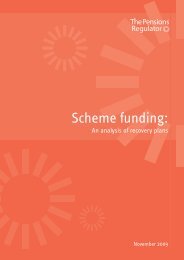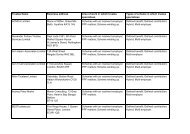Record-keeping: a consultation document - The Pensions Regulator
Record-keeping: a consultation document - The Pensions Regulator
Record-keeping: a consultation document - The Pensions Regulator
You also want an ePaper? Increase the reach of your titles
YUMPU automatically turns print PDFs into web optimized ePapers that Google loves.
6.23 <strong>The</strong> regulator suggests that it is right to take a relatively specific<br />
approach and to focus on outcomes. First, the presence of scheme data<br />
is an area where such an approach is possible. Second, under a<br />
specific approach, those responsible for data will focus in more detail on<br />
its condition compared with more general requirements. Finally,<br />
processes, while vital, are not always sufficient on their own for the good<br />
administration of a scheme. Focusing solely on process can risk gaps in<br />
crucial information such as date of birth of members or information about<br />
deferred members not being picked up promptly.<br />
6.24 It is emphasised, however, that the regulator’s proposals must not be<br />
seen in isolation. In particular, its proposals are not intended to bring<br />
about four related behaviours:<br />
Cost<br />
• ignoring processes: indeed the regulator suggests, above, that in<br />
trust-based schemes, trustees should report on the key risks and<br />
effectiveness of controls in a similar way to what is required in the<br />
corporate and not-for-profit sectors;<br />
• ‘teaching to the test’: focusing only on the presence of data,<br />
especially core data, and not on the other components of good<br />
administration;<br />
• the test driving the presence of data rather than vice versa: for<br />
example, discarding partial data because it leads to a low score;<br />
• ’false complacency’: the assumption, without supporting evidence,<br />
that if core data is present then the scheme is administered well.<br />
6.25 Ascertaining the presence of core and additional data may lead to some<br />
providers, trustees, administrators and employers incurring additional<br />
cost compared with their current practice. <strong>The</strong> regulator would,<br />
however, suggest bearing the following points in mind:<br />
• any additional cost is for the purpose of meeting obligations to<br />
members and others;<br />
• it is not, therefore, a cost of regulation in that it is an activity which<br />
has to be carried out;<br />
• the cost is one which will arise at some point: member records<br />
have to be correct before activities such as payment of benefits<br />
occurs;<br />
• the proposed approach could lead to significant cost savings. It is<br />
easier and cheaper to update member records when there is, for<br />
example, a solvent employer, than doing so during the winding up<br />
of a scheme whose employer is insolvent and whose records may<br />
not be accessible;<br />
• moreover, a scheme whose records are up-to-date will be<br />
cheaper to administer on an ongoing basis;<br />
• a fixed timetable is not suggested for measuring the presence of<br />
additional data. This can be done at a suitable time, for example<br />
as part of the scheme valuation.<br />
<strong>The</strong> <strong>Pensions</strong> <strong>Regulator</strong>: <strong>Record</strong>-<strong>keeping</strong> <strong>consultation</strong> <strong>document</strong><br />
30
















